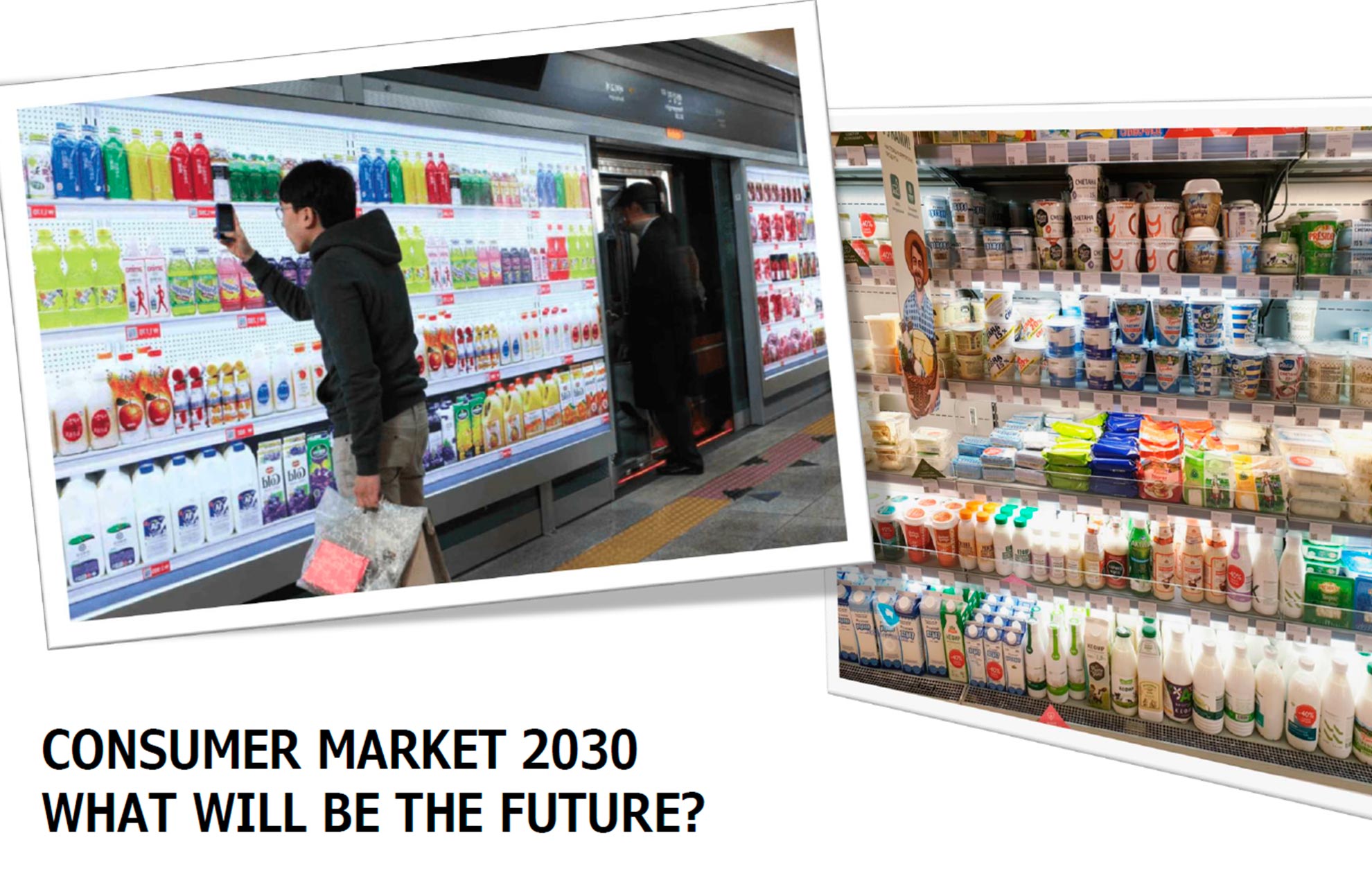
SKOLKOVO Consumer Market Development Center presented a report on the future of the consumer market
Moscow, October 9, 2019 - SKOLKOVO Consumer Market Development Center presented the report on the topic "Consumer Market 2030. What will be the future?". This presentation was prepared as a part of experience exchange between the Center staff. The main emphasis in the report is on the description of the main consumer market trends which already significantly affect the behavior of consumers, retailers and producers.

As a part of experience exchange between the Center staff the report was presented on current and future consumer market trends. Over the next 10-15 years, several fundamentally important consumer market changes are predicted.
- An increase in the population up to 8 billion people by 2024.
- Increase in the share of urban population up to 60% by 2030.
- Reducing the share of the population of developing countries living in extreme poverty to 10% by 2030.
- Increase in the proportion of people with mobile phones to 75% by 2030.
- The development of e-commerce.
- An increase of the middle-class expenses almost threefold by 2030 (mainly due to the China’s population).
In addition, in the next 10 years there will be a strengthening of trends in maintaining a healthy lifestyle, the use of the concept of "green economy" and the principles of sustainable development, the widespread penetration of the Internet in all areas of the planet.
The report formulated several major groups which are closely related with each other: consumer; producer and retailer; consumer and retailer interaction; technology and innovation; market conditions.
How will the consumer change?
Firstly, more and more consumers will leave information about themselves.
Secondly, consumers will become more and more demanding and informed about the purchased products or services. Thanks to the development of social networks and various platforms for comparing characteristics (Yandex.market; SkyScanner; Booking.com; TripAdvisor, etc.), consumers can now fully study the purchased goods.
Thirdly, the principles of sustainable development and social responsibility of the brandwill begin to play an increasingly important role in consumer choice.
Fourth, nowadays, most consumers never use one channel for purchasing goods. . Online and Offline trading are combined and balanced by everyone.
How will the producer and retailer change?
Firstly, there has been a constant enlargement and scaling of businesses into new niches for a long time. At present, the scale of the company is not about “economy of scale”, but about access to an increasing number of consumers.
Secondly, the development of technology will allow producers and retailers to optimize various business processes.
Thirdly, omnichannel will receive significant development, which will primarily be characterized by the transition of traditional trade to the online sector (online stores, VR showcases, etc.), and e-commerce to offline formats (postomats). Active development will be in "stores in stores" format.
Fourth, the offline-store format will be substantially rethought. The main question: «What role will a physical store play in your business?»
Fifth, marketplaces (Amazon, Alibaba, etc.) will gain more and more development.
How will the relationship between consumer and retailer change?
- The experience gained from interacting with the store. (brand) will become even more important for consumer. On the one hand, it is: parking, competent sales specialists, the ability to return goods without any problems, several payment options. On the other hand, it is the mood created by the store, emotions, and memories. The most important in the future will be the KPI – experience per square meter.
- Big data analytics will allow you to personalize the product for each consumer (by offering unique benefits for everyone)
- New approaches to marketing and product promotion will significantly change in the near future. Within this block, two main areas of marketing can be distinguished:
- Advertising through social networks, streaming platforms; mobile advertising; stocks inside apps; QR codes with coupons, discount in exchange for an opinion; banner and outdoor advertising based on big data analytics of passing people. The construction of the Customer Journey Map will be increasingly developed.
- Increasing the openness and transparency of the company’s business; increased social responsibility of producers and retailers; involvement of consumers in the life of the company (interaction in chats, social networks; conducting experiments involving customers).
- We are moving towards reality, where everything happens here and now. According to KPMG, 64% of consumers say that they expect companies to interact with them in real time in the future. Thus, the point of first contact with the brand or company and the moment when the product is already in your hands is coming closer.
- The role of various activist movements is increasing, which affects the ability of consumers to turn to non-profit organizations for help and to defend their rights.
- The "sharing economy" will be increasingly developed. According to forecasts, the volume of the sharing economy will reach $300 million by 2025.
- Social networks will compete with marketplaces.
How will technology evolve?
- The development of big data analytics analytics that can be used to study consumer behavior and emotions; analysis of the company's internal processes (demand, supply, product residues); analysis of interaction with consumers; providing recommendations (nutrition, physical activity).
- 3D-printingwhich allows companies to create cheap prototypes of almost anything.
- Augmented reality technologies (AR, VR) are already actively used by clothing manufacturers.
- The development of artificial intelligence. According to some forecasts, 85% of interaction with customers will be carried out without human intervention by 2020. Mostly chat bots will be actively used during communication. AI passed the Turing test completely in 2014, according to the Independent newspaper. AI will actively develop in robotics. Smart AI robots are already helping people to navigate large stores and find products
- Development of various payment systems. Payment systems currently are available by QR code in some countries (Alipay, WeChat). Alternative payment systems will also be developed - FaceID, DNA-ID, etc). For example, 50% of all mobile payments in the world are currently made in the M-Pesa mobile payment system – Vodafone and Safaricom launched it in Kenya. It is used by 19 million inhabitants of the country.
But the future of Russian consumer market is closely connected with the joint work of all consumer market participants (producers, retailers, consumers and public authorities).
Subscribe for our news
Stay tuned! Subscribe for our news. Wу will send you invitations to our events and special educational offers.
Follow
us online
Watch
lectures
Become a part
of our community
Visit
our events
Career
at School
Contact
us
- +7 495 539 30 03
- info@skolkovo.ru
- Call back request

Consent to the Processing of Personal Data
Hereby I, hereinafter referred to as the «Subject of Personal Data», pursuant to the Federal Law of 27.07.2006 № 152-FZ «On Personal Data» (as amended), freely, of my own accord and in my own interest, give my consent to the Moscow School Management «SKOLKOVO» (hereinafter referred to as the «School», legal address: 143025, Moscow region, Odintsovsky district, Skolkovo, Novaya Street, 100) to the processing of my personal data provided during the registration by filling out the web form on the School's website skolkovo.ru and its subdomains *. skolkovo.ru (hereinafter referred to as the «Website»), directed (filled) with the use of the Website.
I understand personal data as any information relevant to me as the Subject of Personal Data, including my last name, first name, address, education, occupation, contact information (phone, fax, email, postal address), photographs, and other information. I understand the processing of personal data as the collection, classification, accumulation, clarification, updating, modification, use, distribution, transmission, including cross-border, depersonalization, blocking, destruction, permanent storage, and any other actions (operations) with personal information.
The processing of personal data of the Subject of Personal Data is carried out solely for the registration of the Subject of Personal Data in the database of the School and then directing to the Subject of Personal Data mail messages and SMS notifications from the School, its affiliates and/or sub-contractors, including advertising content, information letters and newsletters, invitations to the events of the School, and other advertising and news content, as well as for the confirmation of the identity of the Subject of Personal Data when visiting the events of the School.
The date of issue of the consent to the processing of personal data by the Subject of Personal Data is the date of sending the registration form from the Website of the School.
The processing of personal data of the Subject of Personal Data can be accomplished by means of automation and/or without the use of automation in accordance with applicable laws of the Russian Federation and internal regulations of the School.
The school takes the necessary legal, organizational and technical measures or ensures their application to protect the personal data against unauthorized or accidental access, destruction, modification, blocking, copying, providing, distribution of the personal data, as well as other illegal actions towards the personal data and commits itself to preserve the confidentiality of the personal data of the Subject of Personal Data. The school has the right to involve subcontractors in the processing of personal data of the Subject of Personal Data subjects as well as the right to transfer the personal data to its affiliates for processing, ensuring the assuming of the relevant obligations of personal data confidentiality by such subcontractors and affiliates.
I am aware that:
1) this consent to the processing of my personal data provided during registration at the Website of the School and directed (filled) with the use of the Website is valid for twenty (20) years starting from the date of the registration at the Website of the School;
2) the consent may be revoked by me on the basis of a written application in optional form;
3) the provision of personal data of third parties without their consent is punishable in accordance with the current legislation of the Russian Federation.
